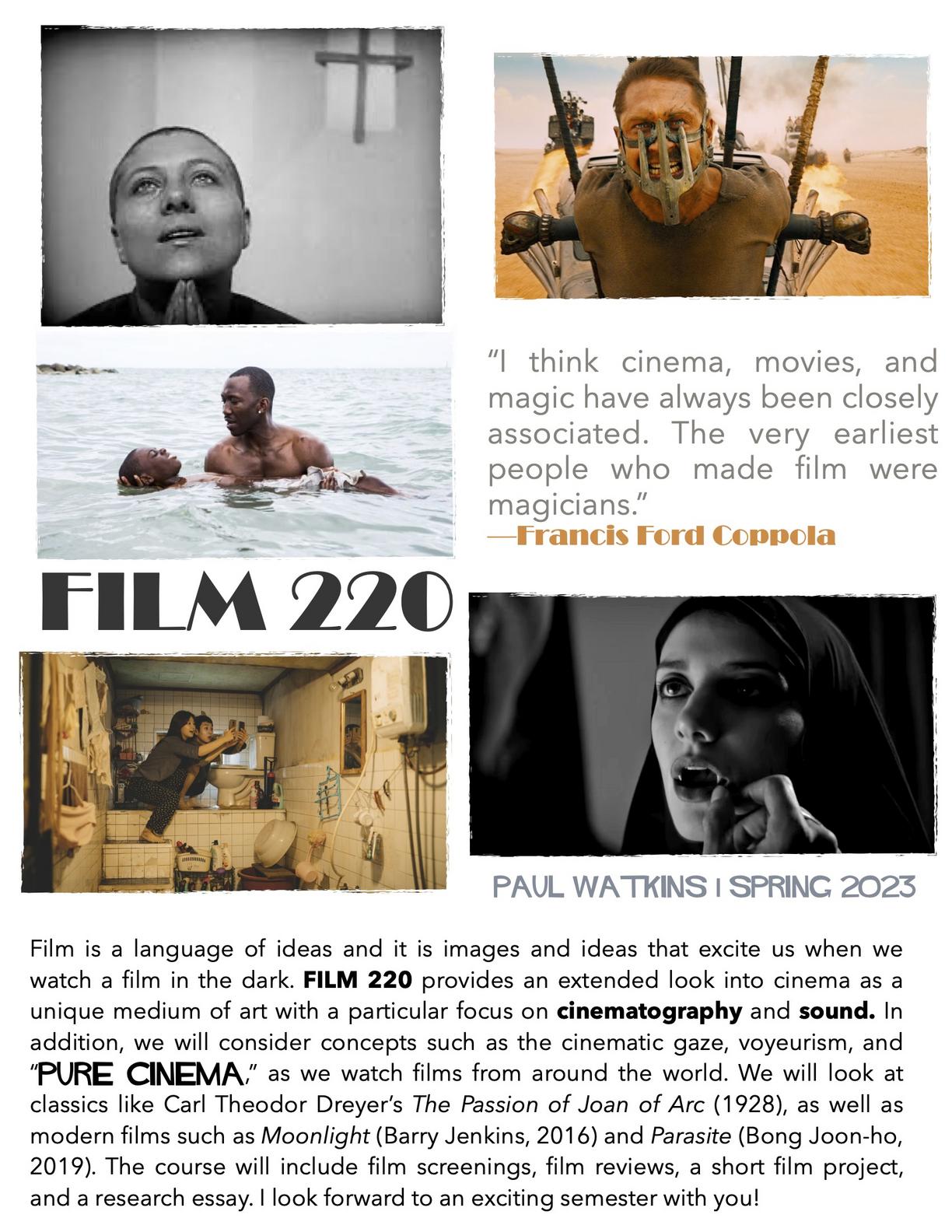Fall 2022
| Course Number | Course Description | Professor |
|---|---|---|
| 204 | Business and Technical Writing | Multiple Instructors |
| 208 | Introduction to Public Speaking | Multiple Instructors |
| 222 | Introduction to World Literature | Doughty |
| 230 | Literature and Popular Culture | Burgoyne |
| 231 | Speculative Literature | Burgoyne |
| 232 | Children's Literature | Klan |
| 233 | Literature and Film | Armstrong |
| 273 | Ancients and Moderns | Hagan |
Spring 2023
| Course Number | Course Description | Professor |
|---|---|---|
| 204 | Business and Technical Writing | Multiple Instructors |
| 208 | Introduction to Public Speaking | Multiple Instructors |
| 220 | Canadian Literature in Context | Smith |
| 221 | North American Indigenous Literatures | Thompson |
| 240 | Ways of Reading | Armstrong |
| 274 | Literary Traditions | Crover |
| 280 | Book Club | Moosa |
| 220 | Special Topics in Film Studies | Watkins |
Fall 2022 – Course Descriptions
ENGL 204: Business and Technical Writing
Multiple Sections

An introduction to business and technical communication skills with a focus on documents (such as letters and reports) and presentations. Topics may include planning, outlining, summarizing, presenting data, handling references, and editing. The course comprises several practical assignments, including a formal report and an oral presentation. ENGL 204 was formerly called ENGL 225; credit will not be granted for both courses.
ENGL 208: Introduction to Public Speaking
Multiple Sections

An introduction to public speaking that focuses on the creation, organization, and delivery of speeches for non-dramatic purposes. It provides the rhetorical principles of effective and ethical public speaking, offers opportunities to become familiar with different speaking situations, and attempts to instill a sense of the importance of public speech. ENGL 208 was formerly called THEA 203; credit will not be granted for both courses.
ENGL 222: Introduction to World Literature
Professor Terri Doughty
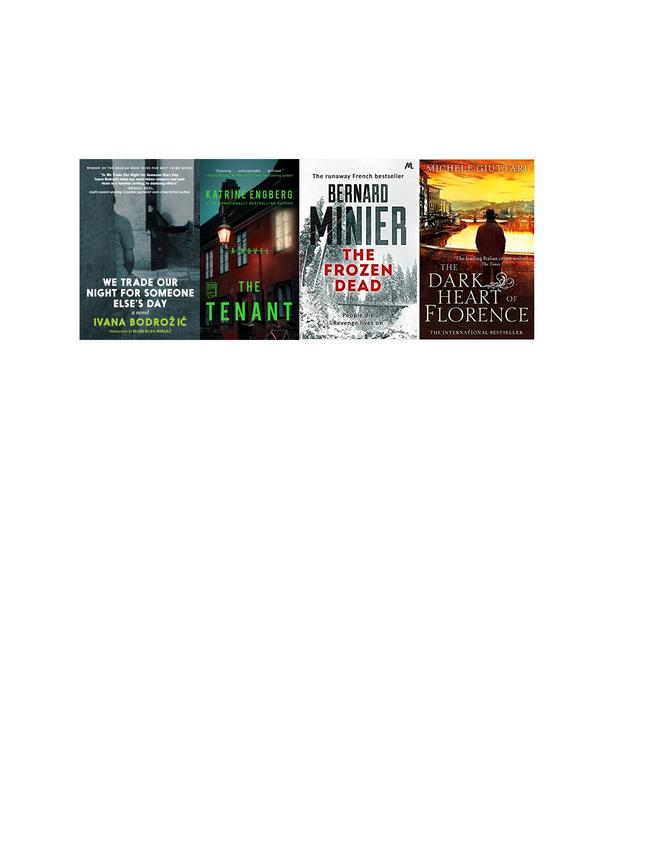
The first victim is a horse. A serial killer haunts a city. A landlady's crime novel in process is being acted out in real life. Intergenerational secrets and crimes drive a reporter seeking truth. Crime fiction/mysteries/thrillers explore disruptions to social order, deviance, and transgression. Such genre fiction also provides insight into cultural values and issues. This term we will read in English translation a selection of six crime novels from a range of European countries (e. g. France, Italy, Denmark, Croatia, Russia, Germany), focusing on how these texts participate in an international literary market while also reflecting distinct cultural perspectives. Is reading these books simply a form of entertaining literary tourism for Canadian readers? How do popular genres cross cultural boundaries? How does genre fiction (re)produce culture?
ENGL 230: Literature and Popular Culture
Professor Daniel Burgoyne
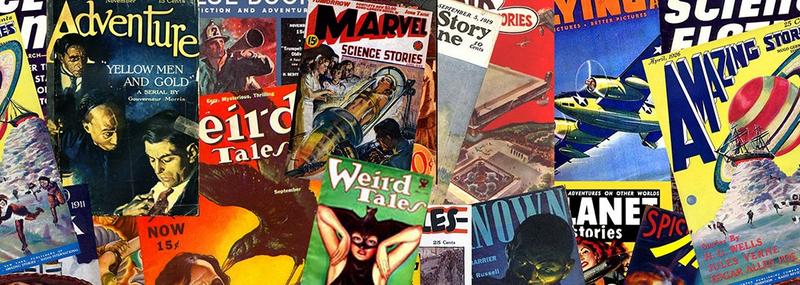
This course explores intersections between literature and popular culture beginning with early 20th-century pulp fiction and then following its influence on examples of genre fiction up to the present day. With a focus on Edgar Rice Burroughs’ serialized novel, A Princess of Mars, as well as a sampling of stories published in pulp magazines in the 1920s through 40s, we’ll consider how pop culture encouraged formulaic narratives and stereotypes while broadening reading audiences and forging distinct genres, such as westerns, romances, science fiction, and detective fiction. Our later exploration will include examples of Romance, YA Fiction, and Comics. We’ll make use of different critical approaches to pop culture to think about how the popularization of stories shapes our sense of literature and the world.
Textbooks
- Edgar Rice Burroughs’ A Princess of Mars
- Lynne Graham’s The Ring the Spaniard Gave Her
- Suzanne Collins' The Hunger Games
- Neil Gaiman, Sam Keith, Mike Dringenberg, & Malcolm Jones III’s The Sandman Volume 1: Preludes & Nocturnes
- Jeffrey Andrew Weinstock’s Pop Culture for Beginners
Please contact me if you have any questions: Daniel.Burgoyne@viu.ca
ENGL 231: Speculative Literature
Professor Daniel Burgoyne
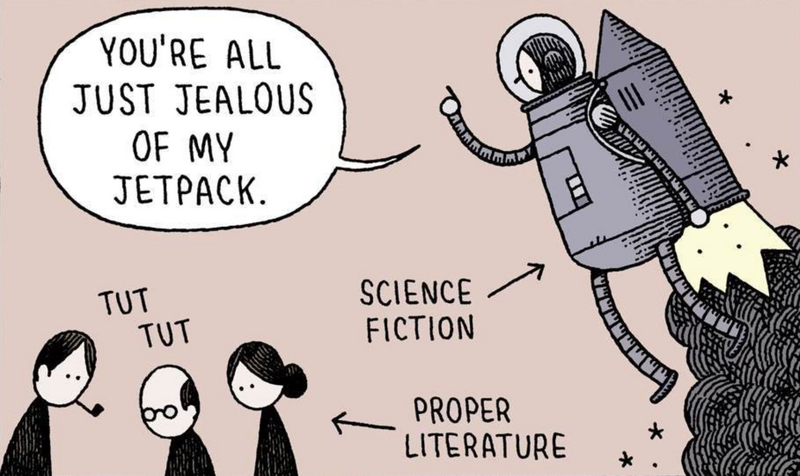
This course will be taught entirely online.
This course is an exploration of how the genre of science fiction developed from the 19th to the 21st centuries. Beginning with the “scientific romance” of H. G. Wells and stories from mass market publications, we will focus on how “science fiction” emerges as a genre in the first part of the twentieth century. Following this, we’ll look at how it reflects historical and cultural contexts during the so-called Golden Age, the “New Wave” of the sixties and seventies, and more recently.
Textbooks:
- H. G. Wells’ The Time Machine
- The Big Book of Science Fiction, edited by Ann and Jeff Vandermeer
- Damien Duffy and John Jennings’ A Graphic Novel Adaptation of Octavia Butler’s Parable of the Sower
- Chen Qiufen’s Waste Tide
The comic is by Tom Gauld. Check out his web page: https://www.tomgauld.com/
Please contact me if you have any questions: Daniel.Burgoyne@viu.ca
ENGL 232: Children's Literature
Professor Nicole Klan
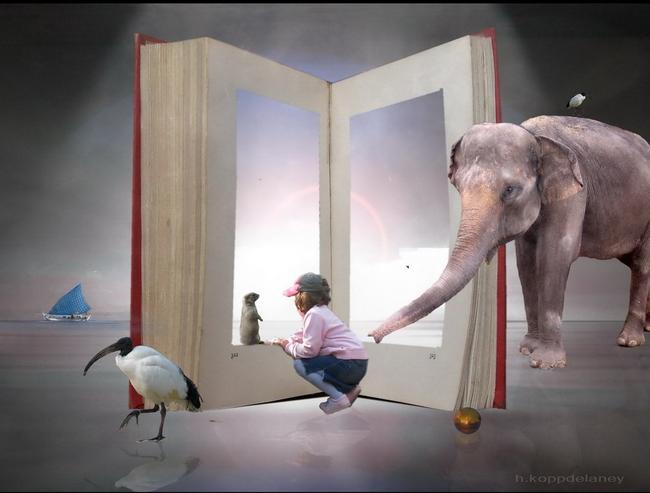
This course will explore themes and trends in contemporary children’s literature with some attention to literary history and critical perspectives in the field. We’ll read picture books, graphic narratives, and novels to expand our understanding of the ways texts represent children and their worlds, revealing assumptions about children and childhood. We’ll consider how texts share or depart from literary conventions and how they respond to current social concerns. Possible texts include but are not limited to Look both ways (Reynolds), The City of Ember (DePrau), Sunny Side Up (Holms), This one summer (Tamaki), The war that saved my life (Bradley), George (Gino), Esperanza Rising (Munoz), The Wild Robot (Brown) and Red: A Haida Manga (Yagulanaas).
ENGL 233: Literature and Film
Professor Clay Armstrong
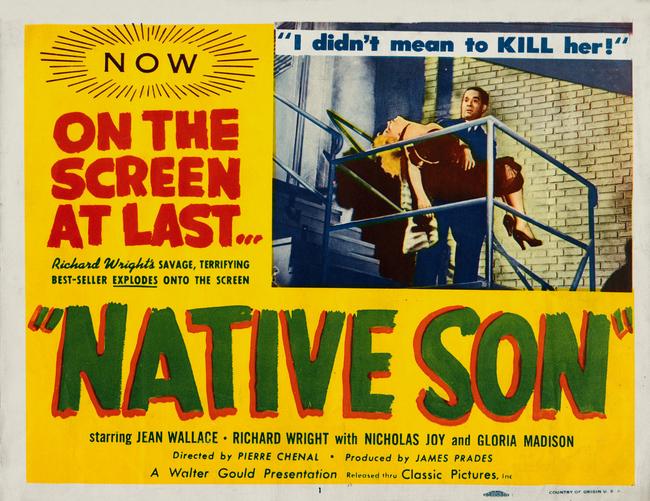
Students will survey notable film adaptations of prominent American Literatures from mid-20th century and following. In parallel with scholarly material used to establish context each week, we’ll examine a range of literary texts including plays, poems, magazine articles, and several very different novels that all represent important voices in American Literature and Film. Primary texts may include: Richard Wright’s novel Native Son; Tennessee Williams’s A Streetcar Named Desire; Lorraine Hansberry’s A Raisin in the Sun; Allen Ginsberg’s Howl; Truman Capote’s In Cold Blood; Michael Herr’s Dispatches; Harper Lee’s To Kill a Mockingbird; Alice Walker’s The Colour Purple; and HE Hinton’s The Outsiders. Attendance for film screening is the most basic requirement of the course. Please note, this material is intended for a mature, university-level audience.
ENGL 273: Ancients and Moderns
Professor Sandra Hagan

Ancients and Moderns – The Wanderer: Calling all wanderers! If you’ve wondered how your own winding paths have been traced out in literature by those who have travelled them before, come explore the idea of wandering in this course. We’ll begin by considering the wanderer in some earliest literary contexts, Ancient Greek; Celtic; and Anglo-Saxon, and follow where wanderers like Ulysses, Fergus, and the Old English Wanderer—or their archetypal journeys–reappear and realign in Modern literature. Modern selections may include texts like Cheryl Strayed’s Wild, Charles Frazier’s Cold Mountain, and Cormac McCarthy’s The Road. As we know from Aragorn’s song in Tolkien’s The Fellowship of the Ring, “Not all those who wander are lost.”
Spring 2023 – Course Descriptions
ENGL 204: Business and Technical Writing
Multiple Sections

An introduction to business and technical communication skills with a focus on documents (such as letters and reports) and presentations. Topics may include planning, outlining, summarizing, presenting data, handling references, and editing. The course comprises several practical assignments, including a formal report and an oral presentation. ENGL 204 was formerly called ENGL 225; credit will not be granted for both courses.
ENGL 208: Introduction to Public Speaking
Multiple Sections

An introduction to public speaking that focuses on the creation, organization, and delivery of speeches for non-dramatic purposes. It provides the rhetorical principles of effective and ethical public speaking, offers opportunities to become familiar with different speaking situations, and attempts to instil a sense of the importance of public speech. ENGL 208 was formerly called THEA 203; credit will not be granted for both courses.
ENGL 220: Canadian Literature in Context
Professor Toni Smith
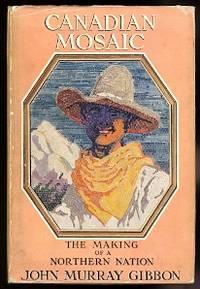
Race and the Canadian Mosaic: Despite our reputation as a multicultural, egalitarian country, as a colonial nation, Canada has a long history of being preoccupied with race. Although pre-confederation settler groups were racially diverse and had complex relationships with their First Nations neighbours, post-confederation nationalism brought a whole new urgency to the bureaucratic and cultural issue of defining both “Whiteness” and “Other.” In this course, we will read widely from across the 19th, 20th, and 21st centuries to learn more about the ways in which “mainstream white Canada” came to be, learn about the history of the “Canadian Mosaic”, and explore how Indigenous writers and those from so-called “hyphenated-Canada” have responded to these categories over the decades.
ENGL 221: North American Indigenous Literature
Professor Dawn Thompson
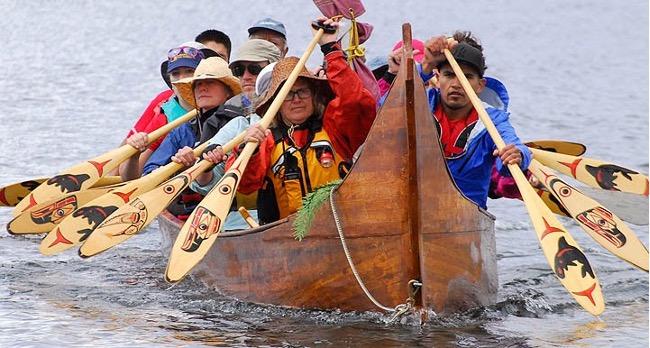
“Na’tsa’maht Shqwaluwun” (“one heart, one mind”)* is the motto for this course, as it is about bringing together: bringing together people who are interested in Indigenous Literatures; bringing together Western academic and Indigenous perspectives on literature and learning; and bringing together, in a respectful way, different cultures and ways of being in the world. Because that is what Indigenous literatures do: they find remarkable ways to merge the story and song tradition of oral cultures with the literary tradition of novels, poetry and drama in order to reach out to, and transform, readers from all cultures. Selected texts will include a transcribed oral story from Ellen Rice White’s Legends and Teachings of Xeel’s The Creator; Leanne Betasamosake Simpson’s Noopiming: The Cure for White Ladies; Lee Maracle, Celia’s Song; along with others. Assuming all goes as planned, this course will be an in-person, face-to-face course. *
Note: I learned this term, and am still learning about its meaning, from my friends at the Office of Indigenous Education and Engagement at VIU.
ENGL 240: Ways of Reading
Professor Clay Armstrong
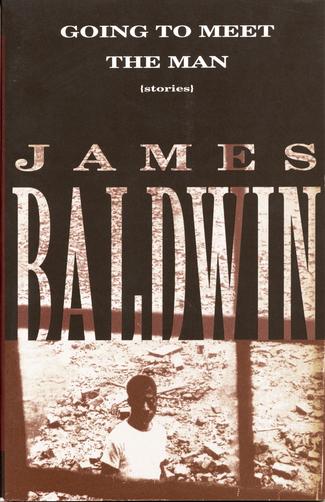
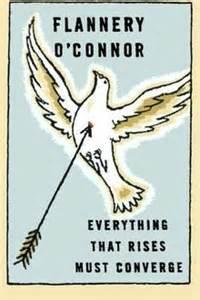
A topical examination of different theoretical approaches to analyzing literature, this course familiarizes students with major critical terms and their practical application in the understanding of literature. Learning outcomes emphasize close treatment of the primary texts, academic research, and the writing process. In particular, students will consider the origins, practice, limitations and influence of New Criticism—a way of reading literature that dominated the university classroom for much of the twentieth century. Rather than seeing poetry and fiction through the lens of cultural history or the intent of the author, New Criticism focuses concretely on “close reading” of the text, or the thing itself. We will explore key essays associated with the development of New Criticism and a range of literatures that draw attention to conspicuous play between form and content. Through selected readings and the major research project, students will be encouraged to explore broader theoretical perspectives that New Criticism at once reacts to and inspires, such as New Historicism and Reader-Response. Our study of ways of reading will flow from the works of Flannery O’Connor and James Baldwin, whose celebrated short stories provoke a range of divergent criticisms.
ENGL 274: Literary Traditions
Professor Sarah Crover
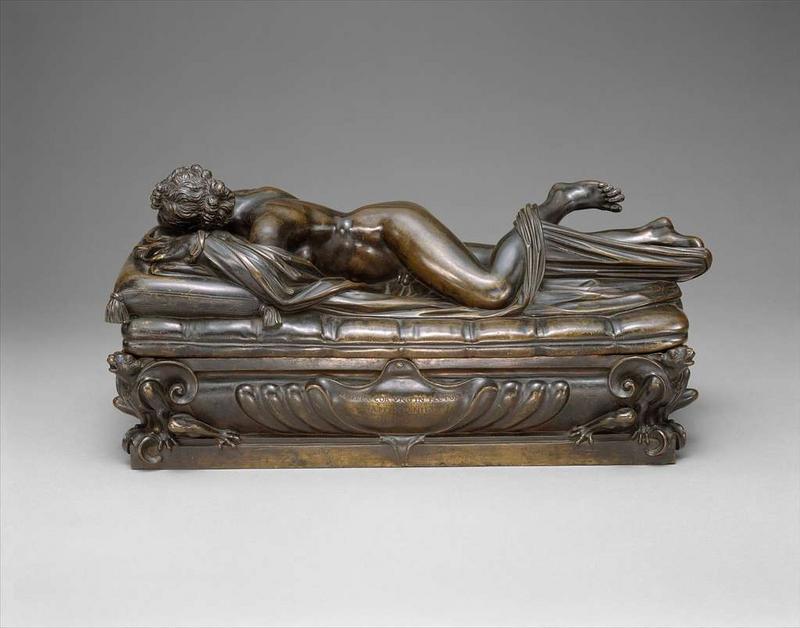
What does it mean to be human? Are we animals or not? At what point do we cease to be recognizably human? Literature involving metamorphosis, particularly transformations from the human into the non-human, reveals our enduring fascination with the unstable boundary between self and other across cultures and generations. To some, the shift between human and nonhuman animal body signified a successful connection with the greater powers of the natural world. To others, it meant degeneration and failure to live up to ‘superior’ human traits. In this course we will explore humorous, tragic or frightening tales of metamorphosis from Ancient Greece to modern day Japan in poems, plays, novels and films. Possible texts include Ovid’s Metamorphosis, Shakespeare’s Venus and Adonis, Mayr’s Dr Edith Vane and the Hares of Crawley Hall, and movies such as Miyazaki’s Spirited Away and Fawcett’s Ginger Snaps.
ENGL 280: Book Club
Professor Farah Moosa
An alternative experience of reading that caters to our more spontaneous relationship with books. Not bordered by analyses of genre or period, this course invites us to celebrate the pleasures of reading, explore its dangers, or delight in the companionship of voices on the page and in the room.
FILM 220: Special Topics in Film Studies
Professor Paul Watkins
